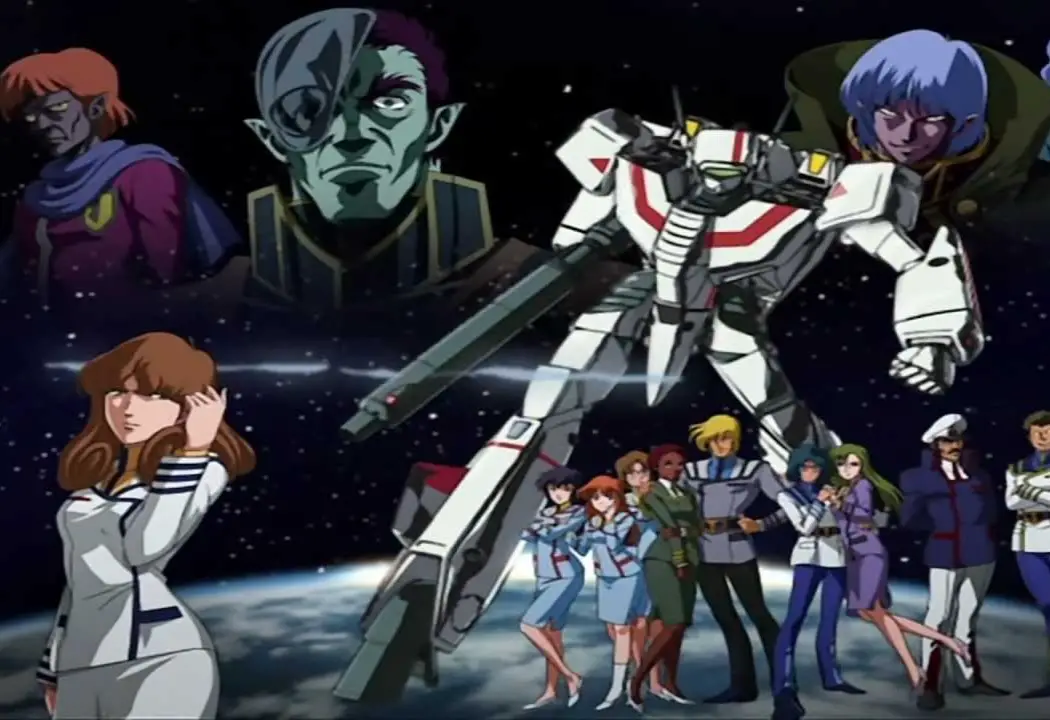ROBOTECH: THE MOVIE: When Cannon Tried Anime

A former video store clerk, Mark has been writing about…
The Cannon Group usually conjures up thoughts of cheap exploitation of c*cky gunmen, fantasy warriors, and American ninjas. One may not expect them to be a distributor of Japanese animation. Okay, maybe you would, but not Japanese animation aimed at children. And while they gave it a shot, Robotech: The Movie ended up being the company’s first and last foray into theatrical animation.
Robotech on TV
Robotech was originally developed for television by Harmony Gold, weaving together the anime series of Super Dimensional Fortress Macross, Super Dimension Cavalry Southern Cross, and Genesis Climber Mospeada into the three seasons of The Macross Saga (Macross), The Robotech Masters (Southern Cross) and The New Generation (Mospeda). The three series originally had nothing to do with each other, besides being sci-fi stories of alien invasions and giant robots, but were combined to meet the television syndication minimum of 65 episodes.
Combined, 85 episodes were produced by Carl Macek, who managed to rewrite and edit all three shows together with a toyline ready to go. And thanks to a massive English voice roster working around the clock, Macek was able to complete the recording of all 85 episodes in an astounding amount of time. Notable names from the cast include voice-acting legends Tony Oliver (Lupin the Third), Cam Clarke (Teenage Mutant Ninja Turtles), Richard Epcar (Ghost in the Shell), and Wendee Lee (Cowboy Bebop).
For a syndicated cartoon of the mid-1980s, the show was considered groundbreaking for its time given the complexities it dealt with about war, relationships, culture, and military drama. Most notable of the show, when compared to its competition of Voltron: Defenders of the Universe, was that death was treated with shock and a sense of loss. Voltron had a laughable sensibility of trying to cover up death at every turn, explaining away on-screen deaths as comas, robot doubles, being sent to another dimension, and so on. Robotech didn’t try to cover up the fact that if you pilot a vehicle that shoots at other vehicles, you may not come back. And you may die in unexpected ways, be it internal injuries or becoming caught in a blast.
Though the show’s big appeal was all about intergalactic war and giant robot action, much of its content was surprisingly more adult for the era. Consider the episode “Rainy Night,” where the two female characters of Lisa and Claudia get together to drink wine and talk about the men they’ve loved and lost. Another surprisingly dark episode was the Christmas special, “Season’s Greetings,” which featured a city destroyed, bitter loneliness, an exploding Santa Claus, and a depressing evening at home with a Christmas cake. And though the plot seems rather convoluted and tricky in connecting all the dots (I’m still not sure how to define the MacGuffin of Protoculture), the action and drama were relatable enough to attract an older fandom. Macek had mentioned in a Robotech DVD commentary that among the fan letters the show received, some were from retired military men.
“Too Many Girls and Not Enough Robots and Guns”
Taking the template he’d used with developing the series, Macek intended to treat Robotech: The Movie the same way. He wanted to draw footage from the anime video Megazone 23 Part I, the story of a rebellious motorcyclist who stumbles onto a government conspiracy when he obtains a secret bike prototype. It was Macek’s wish that this story would parallel with the events of Macross but still be a mostly straight adaptation of Megazone 23. This wish would not come true.
There were two forces holding back Macek’s original vision for this movie. The first was Tatsunoko Productions, the studio that had developed Macross. It just so happened that Macross was taking off in Japan in a big way, as the studio was trying to develop and promote the Macross movie, Do You Remember Love, and a Robotech movie relating back to Macross would only cause confusion. Macek was forced to rewrite the script to exist alongside the events of The Robotech Masters (Southern Cross).

The second force pushing against Macek’s movie was the distributor, Cannon Films. Even if Macek did receive the go-ahead on using Macross for his script, the distributor wasn’t digging the concept, feeling that the movie had “too many girls and not enough robots and guns.” But perhaps the biggest problem was Cannon’s request that the somber ending be changed. This was outside the typical formula of how Robotech was assembled, considering there was no pre-existing anime footage to draw from for a different conclusion. To make this new ending happen, Macek reached out to animation studio The Idol Company to animate a happier conclusion.
Similar to how Robotech was compiled, Macek’s movie stitched together footage from both Megazone 23 and Southern Cross to make the story connections. The results were garish. While Megazone’s animation was highly polished and detailed for home video, Southern Cross had more simplistic and washed-out animation intended for television. The two sources didn’t mesh well. Thankfully, the newly commissioned ending synced incredibly well with the Megazone 23 footage and the new music by Ulpio Minucci and Arlon Ober held up just as well as the show.
The Brief and Failed Test-Run
When the film was completed, Robotech: The Movie had a test-run in a handful of Texas markets in 1986. TV promos were placed alongside the series timeslot of 6:00 am and Macek would appear on a public access talk show to promote the movie (as well as the Robotech sequel series which would not be completed). And Texas is about as far as the film went stateside.
There were a number of issues that led to the film’s quick demise. Story-wise, it had little relation to the Robotech series with few familiar characters, despite using familiar footage. But a key factor in the film not going far was the negative reaction of the family audience. Though Robotech was known for getting away with just a bit more than most cartoons, families weren’t as keen to watch an animated film with their kids where characters are raped, shot in the face, and suffer bloody deaths under rubble. To be fair, this type of presentation does sound more akin to a film from Cannon.
Despite gaining a relatively large draw of crowds for the theatrical screenings, Robotech: The Movie was still considered a failure and did not expand into other states or see a release on home video, though it would become more successful in international markets which saw a theatrical and home video release. Macek considered the film a mistake and decided to wash his hands of the project, especially when he received death threats and angry fans called him the antichrist. He would move onto adapting other adult-oriented anime for the American market with Streamline Pictures, most notable for bringing over AKIRA.
Erasing The Movie
Macek wasn’t kidding when he didn’t want anything else to do with the movie and Harmony Gold wasn’t going out of their way to give the film a proper US release on video. Bits and pieces of the film have been released over the years in various Robotech DVDs but never the full film. The first Robotech DVD collections featured extras of character design sheets, the animatic for the happy ending, TV promos, and Macek’s public access interview. Another release would feature 29-minutes of the film that were specifically assembled from the Southern Cross footage. It seemed as though the full film wouldn’t be released because of the rights to the Megazone 23 footage.
Some Robotech fans had hopes that the film could still be released when Robotech and Megazone 23 crossed paths under the same distributor. ADV Films, a notable home video distributor of anime, had acquired both properties for release on DVD. Carl Macek was even working alongside ADV at the time for producing more animation (Lady Death) and providing commentary tracks for Robotech. But since the original negatives of Robotech: The Movie were lost in a flood during the 1990s, restoring the film would take extra effort in tracking down more pristine sources. And since Macek still didn’t like the film considering how mutated it had become from his original vision, the possibility of remastering the movie seemed very unlikely, despite how much ADV Films wanted to milk Robotech with numerous remasterings and releases.
The Rocky Robotech Future
Robotech: The Movie wasn’t the only Robotech continuation to stumble greatly. Around the same time as the movie’s production, Macek was developing a Robotech sequel series entitled The Sentinels, to feature original animation as opposed to being adapted from Japanese sources. But a toy deal for the project fell through and only three of the 65 episodes were produced, to be released on VHS as a pilot film. Another sequel, Robotech 3000, was planned in the year 2000 and was to be animated using computer graphics but never went further than a trailer. A Robotech sequel movie, The Shadow Chronicles, was completed and debuted in 2007 but was intended to continue its story in another film that would not happen either.

While a Robotech live-action movie seems to finally be getting on track, this project has been talked about for ages and faced numerous hangups before that I’m still skeptical it’ll happen. As of this writing, the current live-action project is to be written by Jason Fuchs (Wonder Woman) and directed by Andy Muschietti (It: Chapter One).
The Untold Story
Given how many anime fans were very vocal with their distaste of Macek retooling anime for the American market, there wasn’t exactly a huge push to preserve Robotech: The Movie. Looking back on the film with its Star Wars style opening credits and choppy meshing of the Robotech lore into the story, it doesn’t exactly exude the same appeal as the already gorgeous anime Megazone 23. Though the film has been preserved online from low-quality sources, there’s little reason to seek out the film past being a Robotech completionist, considering how much better Megazone 23 looks when not filtered through Robotech Americanization.
The alternative title for the film was Robotech: The Untold Story, a fitting subtitle for a film that Macek and hardcore anime fans who despised Americanization could live with being lost. Still, it’s worth noting that Cannon briefly dabbled in anime, a boundless territory that certainly could’ve satisfied their exploitation desires over time. Robotech just might not have been the right project for them to start with, although when Macek first pitched the film to Cannon head Menahem Golan, he remarked: “Now that’s a Cannon movie!”
If you happened to catch this lesser-known Cannon film, let us know what you thought of the film and if it was indeed a Cannon movie.
https://www.youtube.com/watch?v=LBHqMO3vv-Y
Does content like this matter to you?
Become a Member and support film journalism. Unlock access to all of Film Inquiry`s great articles. Join a community of like-minded readers who are passionate about cinema - get access to our private members Network, give back to independent filmmakers, and more.
A former video store clerk, Mark has been writing about film for years and hasn't stopped yet. He studied film and animation in college, where he once set a summer goal to watch every film in the Criterion Collection. Mark has written for numerous online publications and self-published books "Pixels to Premieres: A History of Video Game Movies" and "The Best, Worst, Weird Movies of the 1990s."













